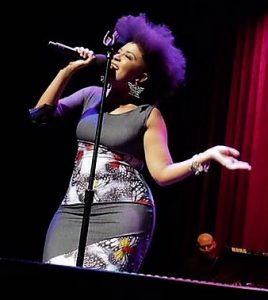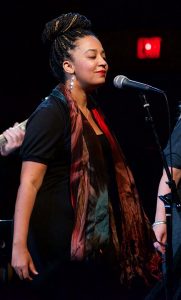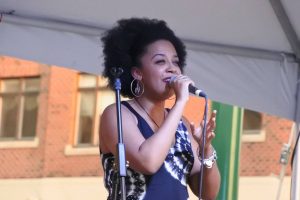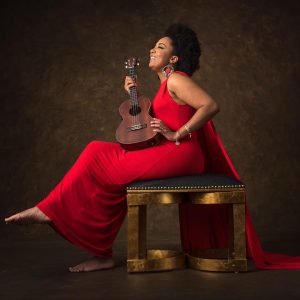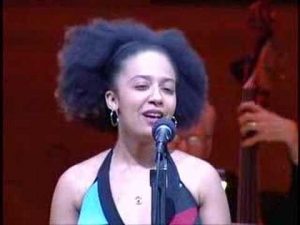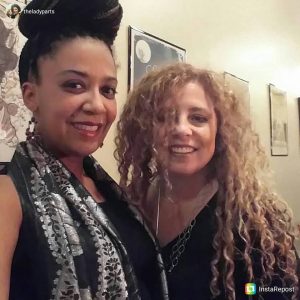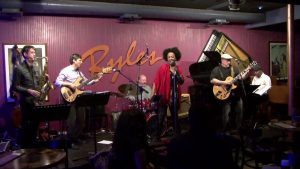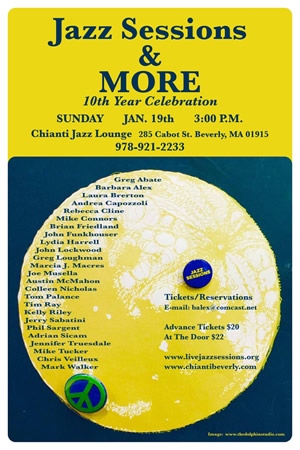Jazz chanteuse Lydia Harrell has been on the Boston music scene since 1999, moving here from Battle Creek, Michigan, home of Kellogg breakfast cereals. Harrell had attended Kellogg Community College then moved to Boston to attend Berklee College of Music. Yet, not coming from money, the singer couldn’t afford to attend, so she got a job across the street from the music school.
“I put up fliers and I just started singing in original bands pretty much right when I got here,” she said. “It just went from there and blossomed.”
Harrell’s musical training consisted of her high school music courses as well as music programs at Kellogg Community College. That was where she learned classical and musical theater. Yet, her metamorphosis into a jazz singer was a process that just pushed its way into being.
Harrell had heard plenty of jazz playing in her childhood home as she was growing up, thanks to her parents’ record collection. “I didn’t start doing jazz until I moved here,” she said. “I started taking separate lessons outside of Berklee since I couldn’t afford Berklee. For me, I’ve learned that improvisation has a lot to with just jumping right in and doing it.”
Harrell’s jazz credentials includes two summers performing at Salem Jazz And Soul Festival in Salem, Massachusetts. She’s been featured at Arlington’s A-Town Jazz Festival as well as a jazz fest in East Lansing, Michigan. “This year, I don’t have any lined up, but they do happen pretty often,” she said.
Harrell’s last EP, titled The Way, featured one original as well as Wayne Shorter’s “Foot Prints” for which she wrote words, making it half original. Thelonious Monk’s “Round Midnight” received a Harrell arrangement on the EP too. She currently has a much larger recording project in the works, which occasionally slows down or pauses, which might be released within a year.
“I want better quality than the previous one,” she said. “I’m not saying the previous one was bad, but we’re supposed to be gradually improving through our careers. I want to make sure I get really great players, really great engineers, really great sound, get exactly what it is I’m looking for. This is not a slight to any of the musicians or engineers that are on my previous one. It’s my growth as a musician.”
A songwriter, Harrell is forced by her craft to continues to learn and grow because there are so many different approaches. She learned from being around other songwriters. After six months living in Boston, she moved in with a good chunk of the band that she was in.
“I’d wake up in the morning, eat breakfast, and then we’d all break off into our own rooms, come up with ideas, meet back up later and say ‘Here’s what I got.’ Then we’d collaborate and write great songs. I miss that time so much.”
Harrell’s song “Black Friend,” a personal protest song about being a token black, came to be while she was sitting in her living room playing her ukulele. Her instrument has a happy island sound which inspired her to write a serious song with a serious topic over something that sounded joyful and light hearted. At the same time, Harrell was inspired by closely following the news of the time in which racism was resurfacing.
“People say ‘I have a black friend or two’ but if you just go through their social media photos, you see them with no black people anywhere in their photos. You know from their daily life whether they’re genuine friends. The black friend they may have may not actually be their friend. It’s just somebody they’re acquainted with and they want to use that as a justification.”
Raised in a predominantly white community, that would be a personal issue for Harrell. “That line where I said ‘I have a black friend.’ That actually happened to me once when I was a teenager. This guy said something really derogatory toward me. I can’t remember exactly what it was. But, it was something really mean, enough for me to go across the street where he was and ask ‘What did you say to me?’ And he was like ‘I’m not racist. I have a black friend.’” Harrell told the person it was a weird response because she was not questioning if he was racist. She only wanted to know if he had something disrespectful. Then she noticed that a lot of people use the line about having a black friend.
A white man she had dated during her younger days had parents who didn’t like the idea of their son dating a black woman. That fellow went on to marry a different black woman and had children. His parents saw Harrell years later and apologized to her for being closed minded.
“It is possible to educate people and have them change their mind on that,” the jazz chanteuse said. “We just have to let go of the whole outer, the skin color, and sexual preference because that’s not their personality. That’s not who they are.”
Many of the jazz greats that Harrell covers and rearranges were people of color but, in that instance, she isn’t making a statement. It was just the kind of music that she grew up hearing in her
childhood home. She’s also a big fan of Soundgarden, Audioslave, Nirvana, and The Foo Fighters who were the in thing during the 1990s.
“I want to do a jazz album on that,” she said, “me and piano and upright bass and just do something fun with all those songs that I really love.”
Yet, racial awareness is important to Harrell. The singer wears her hair in a natural afro, eschewing conk and other straightening products. “It is important to me,” she said. “I feel we all need to be whatever we are naturally. We should not be embarrassed if our hair is curly.”
Harrell referenced early black balladeers like Nat King Cole, Cab Calloway, and Duke Ellington who used hair products. “They put all this stuff in their hair and straightened their hair and slicked it back because that was more appealing than their curly afro here. At least back then. That’s what was commercial. It was what made them a little more palatable.”
While Harrell understands what African-American artists had to do back in the day, she’s grateful much less pressure exists today. “I’m just glad now we’re embracing our natural, just our natural everything, who we are.”
Empowerment and perseverance are key themes in Harrell’s musical career and personal life. One of the ironies of Harrell life is that she is now teaching at Berklee, the college she could not afford to attend when she arrived in Boston 20 years ago. The singer knew that because she never finished her Bachelor’s degree, the only way she could get into a teaching position was by having a lot of experience. She began giving lessons out of her apartment before working for six years at a local music school. That was when she began applying to the prestigious Boston music college. She applied three years in a row and she was turned down each of those three times.
“Every year that I applied, my resume got better, with more accomplishments that I had made which was appealing to Berklee,” she said. “There would always be someone a step further with either their experience or their degree or both. I didn’t feel bad about it. It’s a college. It’s not the easiest thing to get into.” Fortunately, all those notices about keeping her resume on file were true.
“For all those people out there who think ‘Oh, when we’ll keep you on file‘, don’t think they don’t. Sometimes they do,” Harrell said. Finally, someone at Berklee called her, interviewed her, and decided Harrell was a good fit for Berklee’s Voice Department.
“I’m already starting to be included in more things, like the performances I have coming up there and auditions for the students and summer programs. I’m really looking forward to what it is I’ll be included in in the future.”
Harrell’s many musical accomplishments are varied. She happens to have sung lead vocals on 11 out of 15 songs on a Bob Marley tribute album. That opportunity came about after Sony Music Latin held auditions at Berklee back in 2010. Harrell heard about the auditions from a friend working at the college. “It was a lot of fun. They flew me out to Florida. I stayed there for a week,” she said. “I’ve always been in studios before but never quite at that level where it’s Sony Music Latin The voice coach that was in the studio was Mark Anthony’s voice coach.”
For the last 12 years Harrell has been a backing singer for the Steely Dan tribute band No Static. A member of an earlier version of Booty Vortex at the same time, Harrell couldn’t resist the intellectual appeal of Steel Dan’s lyrics, harmonies, and complex melodies.
“It’s kind of filthy sometimes. Donald Fagen’s lyrics are like ‘Whoa, why did he say that?’ But, the harmonies are beautiful. I don’t get to say that I’m in a jazz-rock band very often, but that’s pretty much what Steely Dan is.”
Over the years Harrell has become synonymous with her moniker Lovely Singer, which started when a then boyfriend suggested it for her e-mail address. She also bought the domain name and the rest is history. “It’s not a very exotic of fun story,” she said. “It’s just ‘I’ll call myself Lovely Singer and it stuck.”
Harrell and her dear friend and fellow singer, the ubiquitous Kit Holliday, formed a female harmony duo for hire called The Lady Parts. Named for the female high harmony lines by their photographer Caroline Alden, it’s another name that stuck. People sometimes misunderstand the duo name. “You can take it to the gutter if you want to, but we really are singing the lady parts,” Harrell said.
Harrell’s skill set also includes acting, going back to musical theater to community college. She pursued it more thoroughly four years ago when she joined Boston Casting, took some classes, and got an agent. She auditions often and has been selected for local TV commercials and corporate training videos. One TV commercial featuring Harrell for Harvard Pilgrim resulted in her image being placed on the billboard Boston commuters can see from the Route 93 overpass a half mile before the exit for Government Center.
“I showed it to my son and he was all stunned,” Harrell said. “I was getting lots of phone calls. I guess it’s all of New England so people were seeing it in Connecticut and Rhode Island.”
From this point forward, Harrell would like to take her acting, her music, and her new position in Berklee’s voice department as far as she can take them. “What I like to call my really big heart to leap goal is to be in a Marvel movie or TV show. I’m a big Marvel superhero geek,” she said. “I also want to continue making music and just making it because I love it but also maybe making something for film, like making music that ends up in a film.”
